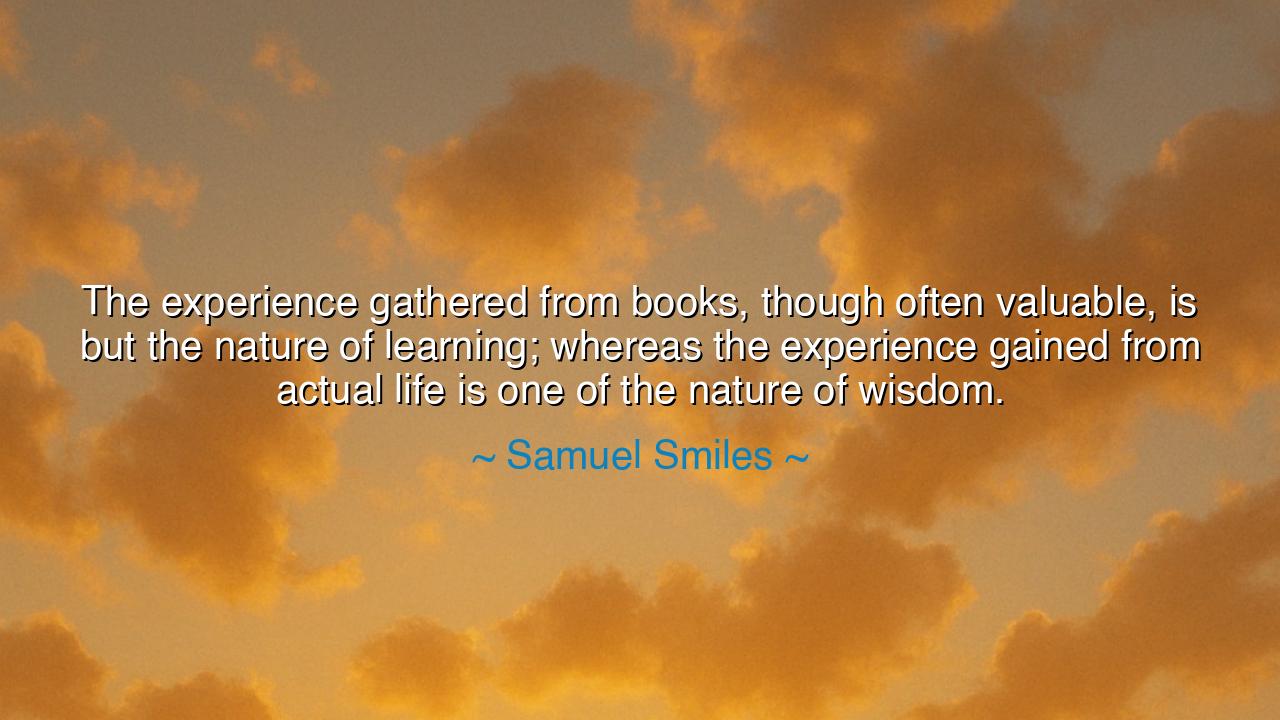
The experience gathered from books, though often valuable, is but
The experience gathered from books, though often valuable, is but the nature of learning; whereas the experience gained from actual life is one of the nature of wisdom.






There are truths that shine brightest when drawn from the contrast between what is learned by the mind and what is understood by the heart. The moral philosopher Samuel Smiles, whose writings inspired a generation to rise through diligence and virtue, once said: “The experience gathered from books, though often valuable, is but the nature of learning; whereas the experience gained from actual life is one of the nature of wisdom.” In these words, Smiles reveals the eternal distinction between knowledge and wisdom, between the scholar who reads of storms and the sailor who endures them.
The meaning of his words lies in the recognition that book learning, though noble and necessary, remains incomplete without the crucible of living experience. Books may instruct the mind, but life instructs the soul. The written word teaches us what ought to be done; the world itself teaches us how to do it. A man may read a thousand volumes on virtue, courage, or love — but until he has faced temptation, fear, or heartbreak, these ideas remain but shadows of truth. Only when theory meets the test of reality does knowledge ripen into wisdom.
The origin of this thought arises from Smiles’s own time and life. Born in nineteenth-century Scotland, he lived through an age when the industrial world was changing rapidly, when success was measured not only by intellect but by endurance, character, and labor. His book Self-Help became a scripture of the working class, teaching that men and women build their destinies through perseverance and moral strength. He had seen that too many who were “learned” lacked the resilience that life demands — for wisdom cannot be inherited or memorized; it must be earned, forged in the fires of trial.
Consider the example of Abraham Lincoln, who had little formal education yet became one of history’s greatest statesmen. His “books” were the hardships of frontier life, the failures of youth, the sorrow of war, and the burden of leadership. These experiences carved into his spirit a depth no classroom could provide. Lincoln’s wisdom was not of paper and ink but of suffering transformed into understanding. He learned, as Smiles taught, that true insight is gained by walking through the storm, not by reading of it in safety.
Smiles’s words also warn against a danger that plagues every age — the illusion that intellect alone is virtue. The learned man may quote the ancients and yet falter in humility; the wise man may speak little, yet his actions heal and guide. Learning fills the mind, but wisdom shapes the heart. One may memorize the laws of gravity, but to climb a mountain is to feel them; one may read of compassion, but to forgive an enemy is to become it. Thus, wisdom is the marriage of understanding and experience — a union that no book can arrange by itself.
The lesson is clear: seek not only to know, but to live what you know. Study the principles of goodness, but also walk among those who suffer. Read of patience, but practice it when life delays your hopes. Read of courage, but act upon it when fear grips your heart. The wise are not those who know the most, but those who apply what they know with grace and integrity. Every trial, every mistake, every victory is a page written in the living book of the soul — a book no library can contain.
So let the teaching of Samuel Smiles be remembered: learning is the seed, but life is the soil. Read, and you will understand the words of others; live, and you will understand the truth of your own heart. Do not fear the hardships of experience — for they are the hand of wisdom shaping you. When you have failed and risen, when you have wept and forgiven, when you have loved and lost and still chosen hope — then you will know what no book can teach: that wisdom is not found in reading about life, but in living it bravely and well.






AAdministratorAdministrator
Welcome, honored guests. Please leave a comment, we will respond soon